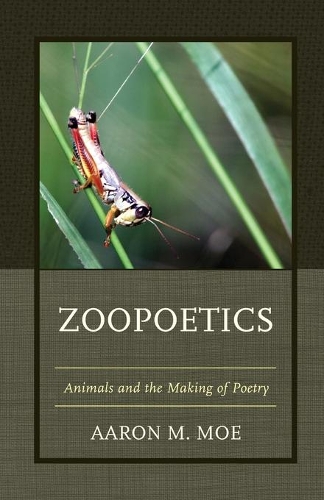
Zoopoetics: Animals and the Making of Poetry
(Paperback)
Publishing Details
Zoopoetics: Animals and the Making of Poetry
By (Author) Aaron M. Moe
Bloomsbury Publishing PLC
Lexington Books
14th November 2016
United States
Classifications
Professional and Scholarly
Non Fiction
Literary theory
811.608036
Physical Properties
Paperback
170
Width 151mm, Height 230mm, Spine 12mm
268g
Description
Zoopoetics assumes Aristotle was right. The general origin of poetry resides, in part, in the instinct to imitate. But it is an innovative imitation. An exploration of the oeuvres of Walt Whitman, E. E. Cummings, W. S. Merwin, and Brenda Hillman reveals the many places where an imitation of another species poiesis (Greek, makings) contributes to breakthroughs in poetic form. However, humans are not the only imitators in the animal kingdom. Other species, too, achieve breakthroughs in their makings through an attentiveness to the ways-of-being of other animals. For this reason, mimic octopi, elephants, beluga whales, and many other species join the exploration of what zoopoetics encompasses. Zoopoetics provides further traction for people interested in the possibilities when and where species meet. Gestures are paramount to zoopoetics. Through the interplay of gestures, the human/animal/textual spheres merge making it possible to recognize how actual, biological animals impact the material makings of poetry. Moreover, as many species are makers, zoopoetics expands the poetic tradition to include nonhuman poiesis.
Reviews
The critical study of ecopoetics demands innovative methodological approaches to reading and thinking about the relationship between poetry, form, and ecology. Moe's book models precisely this type of approach, by bringing critical animal studies to the study of poetry and poetics in a rigorous and sustained way. In this sense, Zoopoetics is an important and timely contribution to a developing field. * ISLE: Interdisciplinary Studies in Literature and Environment *
The virtuosity and knowingness of this reading does justice to persistent demands within ecocriticism for rejuvenated critical attention to the natural world. . . .Moes . . . wide-ranging interest in animal behavior is showcased in the interludes between chapters, brief vignettes that recount engaged encounters between humans and other animals. Ultimately, if theres a critical imperative hidden in Zoopoetics, its the insistence that we allow poetry and animal bodies to overlay one another in translucent palimpsests of meaningwe cant read poems without reading animals first. . . .[This] book will best suit those interested in the pleasures and possibilities of reading poetry. * Humanimalia *
[This is a] wonderfully instructive and challenging book. . . .Moe is an erudite and adept scholar of poetry and the poetic tradition. . . .Zoopoetics ought to attract the interest of literary scholars, poets, and avid readers of poetry alike. . . .Moes extraordinarily exquisite attentiveness to the textual dynamics of the poetry of Whitman, Cummings, Merwin, and Hillmanand, by imaginative implication, the extra-human world, particularly the lives of animalsis exemplary and timely. * Terrain.org *
Zoopoetics is an original, lucid examination of how animals shape the human art of poetry. Drawing upon the foundational work of such scholars as Paul Shepard, Donna Haraway, and David Abram, Aaron Moe uses the Derridian concept of zoopoetics to deepen our understanding of language and our understanding of what animals mean to humans. Without other species, we might be essentially voiceless. This is a significant study of animality, one of the central paradigms in the field of ecocriticism. -- Scott Slovic, University of Idaho, coeditor of The Routledge Handbook of Ecocriticism and Environmental Communication
Aaron Moes Zoopoetics lucidly demonstrates that poetry is a shared space in which human and other animals may stretch toward each other, a space in which many of our best poets in English attend to nonhuman poiesis. This is a timely and important contribution to ecocriticism and animal studies. -- Helena Feder, author of Ecocriticism and the Idea of Culture
Author Bio
Aaron M. Moe has a doctorate degree in literary studies from Washington State University.
